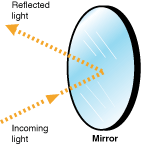The Horror of Electric Lights January 18, 2015
Author: Beach Combing | in : Modern , trackbackNew technologies bring fears with them, of course, and often for very good reasons. Electricity was no exception. You could understand the presence of electrificed objects causing fear, but more refined is the fear of electic light. This particulary story come from 1890. A family in Ottery (Devon, UK) had been terrorised by the new technology to the point of ill health.
One would scarcely credit in the Nineteenth Century persons seeking protection against the electric light, yet such occurred only the other day at Bridge Water. Harriet Davis, a young woman, accompanied by James Davis, formerly a farmer at Ottery, said she had come for an order for police protection, as several persons at Ottery were attempting to ‘poison them with the electric light,’ and without such protection they would be murdered.
This begs the question of how you can poison someone with electric light.
‘The electric light,’ she added, ‘was thrown through the windows into their tea-kettle, their saucepans, cups, and everything they drank from, and her father had been made sick with it’. They could sometimes ‘see the electric light in the air,’ and the persons seemed to have the power of ‘putting it where they liked,’ and it was done night after night. James Davis, the father, in reply to the magistrates, said he also thought they would be done harm if they were not given police protection. They added that they had applied for summonses, but they had been refused.
If this wasn’t 1890 one would assume that some local toughs had been shining a torch through their window in the evening. But the first credible electric torches had only come onto the market the year before in the US and were probably still too much of a luxury item to waste on stunts like this, even if one had found its way into the wilds of East Devon. Then what was the trick? The writer who reported the traumas of the Davis family probably had the right idea: mirrors. Other thoughts: drbeachcombing AT yahoo DOT com
It is scarcely necessary to explain that some gay young ‘sparks’ of the village had been amusing themselves by experiments in ‘flashes’ with a mirror.
Presumably the young ‘sparks’ had a non-electric source of light that they used to reflect their lights into the house in question. The technology for this kind of a game had been around for perhaps three thousand years, but now there was a new filter to understand the phenomenon. Of course a century later it would have been reported as a UFO.
31 Jan 2015: Invisible writes, ‘On electricity poisoning: An early version of the “CIA/Illuminati/sinister cabal of your choice are beaming thoughts into my head?” Some people with certain types of mental illness believe that they are being poisoned–one wonders if this family was known for their delusions in the village and were singled out for torment. On a lighter note, American humorist James Thurber wrote of his mother: ‘Gasoline, oil, and water were much the same to her, a fact that made her life both confusing and perilous. Her greatest dread, however, was the Victrola—we had a very early one, back in the “Come Josephine in My Flying Machine” days. She had an idea that the Victrola might blow up. It alarmed her, rather than reassured her, to explain that the phonograph was run neither by gasoline nor by electricity. She could only suppose that it was propelled by some newfangled and untested apparatus which was likely to let go at any minute, making us all the victims and martyrs of the wild-eyed Edison’s dangerous experiments. The telephone she was comparatively at peace with, except, of course, during storms, when for some reason or other she always took the receiver off the hook and let it hang. She came naturally by her confused and groundless fears, for her own mother lived the latter years of her life in the horrible suspicion that electricity was dripping invisibly all over the house. It leaked, she contended, out of empty sockets if the wall switch had been left on. She would go around screwing in bulbs, and if they lighted up she would hastily and fearfully turn off the wall switch and go back to her Pearson’s or Everybody’s, happy in the satisfaction that she had stopped not only a costly but a dangerous leakage. Nothing could ever clear this up for her.’ My Life and Hard Times, James Thurber



